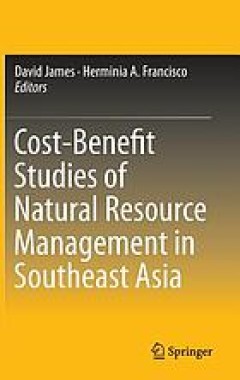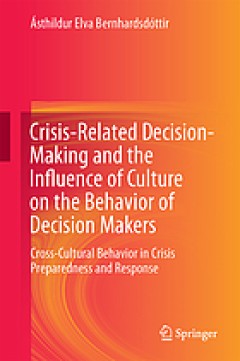Filter by

Cost-Benefit Studies of Natural Resource Management in Southeast Asia
This book applies cost-benefit analysis techniques in the management of environment and natural resources in developing countries of the Southeast Asian region and presents a compendium of studies conducted by researchers supported by the Economy and Environment Program for Southeast Asia (EEPSEA). It emphasizes the close relationship between the environment and natural resources and economic d…
- Edition
- 1
- ISBN/ISSN
- 9789812873934
- Collation
- XVII, 396
- Series Title
- -
- Call Number
- 330

Cost Effectiveness Modelling for Health Technology Assessment A Practical Course
This book provides an introduction to decision analytic cost-effectiveness modelling, giving the theoretical and practical knowledge required to design and implement analyses that meet the methodological standards of health technology assessment organisations. The book guides you through building a decision tree and Markov model and, importantly, shows how the results of cost-effectiveness anal…
- Edition
- 1
- ISBN/ISSN
- 9783319157443
- Collation
- XIII, 208
- Series Title
- -
- Call Number
- 330

Crowdfunding for SMEs : a European perspective
Crowdfunding for SMEs' provides a valuable insight into this new source of capital. In particular, the authors focus on financial return crowdfunding, which repays the crowd either through debt or equity. This source of capital might play a significant role in the future becoming an alternative or a complement to traditional funding sources. It is therefore of the uttermost importance to unders…
- Edition
- 1
- ISBN/ISSN
- 9781137560216
- Collation
- XV, 236
- Series Title
- Palgrave Macmillan Studies in Banking and Financial Institutions
- Call Number
- 338.7

Cross-Border Management : Theory, Method and Application
This book presents a new approach to management in an increasingly interactive world. In this context, the use of the word ℓ́ℓnewℓ́ℓ has two meanings. The first relates to a new definition of borders (which are natural, institutional, functional, or mixed); the second concerns the fact that the book applies (and, where necessary, develops) analytical tools, methods and models that are…
- Edition
- 1
- ISBN/ISSN
- 9783662451564
- Collation
- XXXI, 407
- Series Title
- -
- Call Number
- 330

Critical Studies in Diversity Management Literature: A Review and Synthesis
This book critically examines current workplace diversity management practices and explores a nuanced framework for undertaking, supporting, and implementing policies that equally favor all people. It presents critical perspectives that not only elevate respect for differences but also provide insights into the nature and dynamics of differences in view of an inclusive and truly participative o…
- Edition
- 1
- ISBN/ISSN
- 9789401794756
- Collation
- VIII, 98
- Series Title
- SpringerBriefs in Psychology
- Call Number
- 338.7

Crisis-Related Decision-Making and the Influence of Culture on the Behavior o…
This book provides an℗ℓanalysis on the impact of culture on crisis management, exploring how different cultural types are reflected in crisis-related decision making patterns. Providing an interdisciplinary and international perspective with a rich research and practical outlook, this work is an important contribution to the field of crisis management and decision making. Offering essential…
- Edition
- 1
- ISBN/ISSN
- 9783319207148
- Collation
- XVII, 198
- Series Title
- -
- Call Number
- 330

Credit Rating Agencies: Self-regulation, Statutory Regulation and Case Law Re…
The book examines the role of credit rating agencies (CRAs) in the subprime mortgage crisis. The CRAs are blamed for awarding risky securities ℓ́ℓ3-Aℓ́ℓ investment grade status and then failing to downgrade them quickly enough when circumstances changed, which led to investors suffering substantial losses. The causes identified by the regulators for the gatekeeper failure were conflic…
- Edition
- 1
- ISBN/ISSN
- 9783319179278
- Collation
- XXVI, 266
- Series Title
- -
- Call Number
- 330

Credit Cooperative Institutions in European Countries
This book offers a comparative analysis of credit cooperative systems across 23 European countries. Cooperative banking has an important place in the financial, economic and social life of most European countries, and while cooperative banks, credit mutuals, credit cooperatives and credit unions share the spirit of cooperation and mutuality, they often have very different features, history and …
- Edition
- 1
- ISBN/ISSN
- 9783319287843
- Collation
- X, 444
- Series Title
- Contributions to Economics
- Call Number
- 330

Crafting sustainable wine businesses : concepts and cases
Sustainable wine businesses are being crafted around the world, fulfilling the industry's number one priority - leaving the land in better shape for the next generation. Using four case studies of wineries in both the Old and New Worlds, this book shows students and scholars how to develop and defend metrics for benchmarking wine business sustainability and justify new investments supporting th…
- Edition
- 1
- ISBN/ISSN
- 9781137553089
- Collation
- X, 99
- Series Title
- -
- Call Number
- 330

Creativity in the Digital Age
This edited book discusses the exciting field of Digital Creativity. Through exploring the current state of the creative industries, the authors show how technologies are reshaping our creative processes and how they are affecting the innovative creation of new products. Readers will discover how creative production processes are dominated by digital data transmission which makes the connection…
- Edition
- 1
- ISBN/ISSN
- 9781447166818
- Collation
- XII, 269
- Series Title
- Springer Series on Cultural Computing
- Call Number
- 338.7
 Computer Science, Information & General Works
Computer Science, Information & General Works  Philosophy & Psychology
Philosophy & Psychology  Religion
Religion  Social Sciences
Social Sciences  Language
Language  Pure Science
Pure Science  Applied Sciences
Applied Sciences  Art & Recreation
Art & Recreation  Literature
Literature  History & Geography
History & Geography